One morning in a willow swamp I carried a camera close to a bull moose. I wanted a full-screen portrait. The moose, accustomed to trespassers, calmly went on browsing, his head low. Wanting him head-up. I made a sudden forward lunge. He tipped his antlers forward and came at me. I ran. From a safe place I looked back, saw that the moose had taken only a few steps to achieve his purpose. I gave myself an F. Bad manners, invasion of another creature’s personal space.
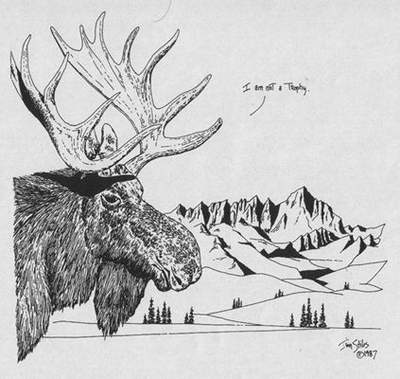 A few years later I met a moose standing on the trail looking at me. On his left, the roaring waters of Cascade Creek, on his right a steep brushy slope. I took to the slope, intending a polite detour. The moose had the same idea. We raced for higher ground. The moose let me win.
A few years later I met a moose standing on the trail looking at me. On his left, the roaring waters of Cascade Creek, on his right a steep brushy slope. I took to the slope, intending a polite detour. The moose had the same idea. We raced for higher ground. The moose let me win.
Encounters like these call for interpreting the minds of others. Of course it doesn’t always turn out in our favor…When a bull elk took the initiative and chased me I had only one option: scramble. When too many of us came too close to a pair of black bear cubs, the mother gave us a lesson. Robert Krear, field biologist, tells of similar experiences.
Concerning lions, both African and American, for example, he advises that steadily meeting the other’s gaze while raising your arms is a useful signal.
The vast majority of creatures do not condescend to negotiation: mosquitoes, blackflies, ticks, leeches … the list is long, but we can be grateful for the buzz of the rattlesnake, the high pitched cries and warning dives of falcons, the sudden synchronized body elevations of wasps, the hiss of the cornered badger. There are many signals out there, information that can make a difference.
But what about machines in our lives? A huge subject, I’ll narrow my question: What negotiation space do foot travelers have when meeting that modern centaur, human-on-machine? Snowmobile, ATV, chopper, SUV, jet ski, power boat, bike … what are the chances? Not good. For one thing, with the exception of muscle-propelled bikes, centaurs don’t hear very well beyond the roar of their motors. For another, they often lack a sense of possible danger that is bound into the daily and nightly behavior of other forms of life. It’s important to know that wild animals are not single-minded lords of their realm; on the contrary their behaviors are complex and finely tuned: when to call, when to stand pat, when to run.
That fine tuning is in us humans too, but in the last few thousand years of thinking lordly, ours has become badly blunted. Consider the range of apprehendings and behaviors of animals who fly under their own power or travel on four feet, or two, or two plus tail, or glide in water by limb, body and tail, or muscle their way underground with snout, shoulder and claws. We are of that lineage, that deep realism of bodies, of senses, created in our long and adaptive adventures as obscure components of earthly evolution. And you don’t need a meditation course to feel it. All you have to do is recognize it. This heritage is one of the reasons I feel violated when uninvited machines enter the scene. I feel trapped, literally. Rage rises, hate shows up. I’m not the only one.
This is not good.
“The hell you say,” respond snowmobile and ATV drivers; bikers and jeep safarists; eco-challenge 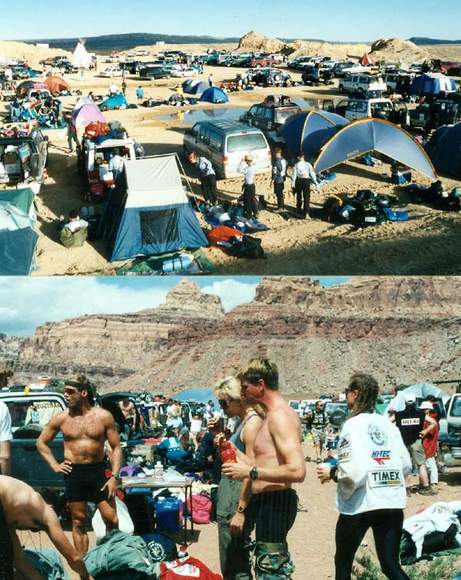 organizers and mountain bike racers. You elitists can’t lock up country for your own exclusive use. We have rights too. You think we don’t appreciate nature?”
organizers and mountain bike racers. You elitists can’t lock up country for your own exclusive use. We have rights too. You think we don’t appreciate nature?”
I can’t answer that last question. You appreciate nature in the ways possible when in centaur mode; you’re the ones to talk about it, if you want to do that. I hope you will. I’m not going to invade your personal space by pretending to know your innermost experiences. I do have to add that nearly all of us who choose to go off-track on two feet know something about centaur life; we’ve straddled bikes, driven vehicles, felt the speed
and spray and joy of abandon, of power. And the limitations too, the way the machine demands constant attention, its needs insistent and primary.
Our experiences do overlap with yours. Will that help, if we sit down for serious discussion?
For the record, I don’t buy the elitist label. That, like cowboy myth rhetoric, is outworn and untruthful. It’s effective only in tearing up more ground between us. Skiers, though, that’s a difficult category. Are some of them still hiring choppers to save them a long alpine slog by lifting them to powder paradises in the Wasatch? Now that’s elitist. I’m not saying that we foot travelers are squeaky clean. Far from it. One of our behaviors that bothers me is the tendency to carry too much stuff. Do we really need to make ourselves into human mules? I’m thinking especially of kids in family groups or safaris led by scout masters or Outward Bound expeditions and the like who labor into wild country overloaded by gigantic packs on young shoulders. Where’s the fun in that? Does it develop individuality, confidence, expertise?
Once I came upon a kid in one of those crocodiles who was literally wobbling from side to side, each step seeming to be his last, and the dad urging him on, and there was agony and hatred on the kid’s face. Hatred of the dad? Could be.
Whether mechanized or not, we’re all implicated in, and captives of a gigantic RECREATION CULTURE where individuals are expected to reach their “own best” and then surpass it. For me, the most aggravating trait of this intense, striving culture is its extreme self-absorption, individual life styles expertly manipulated by solid phalanxes of makers of ATVs, equipment, clothing, adventure and all appurtenances thereto. We endure
countless scenes of environmental gung-ho on millions of screens, every day; tough vehicles driven by rugged trespassers crunching across rough terrain.
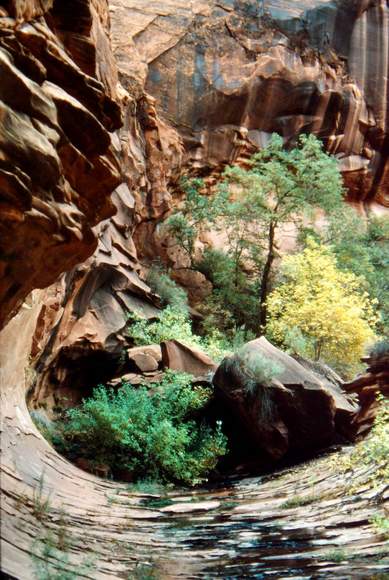 Governments too are players. Consider the Forest Service’s proud slogan, Land of Many Uses. You can even pay to watch wild wolves hunt. The whole shebang, packaged so neatly, we fall for it. One, two, three, down we go. The basic idea seems to be that outside is a place where everybody has inalienable rights to do whatever the hell they take a notion to do, and recreation industries aided by governments are happy to accommodate all comers.If we accept such a premise we’re in for endless turf battles; drawing of complicated lines giving each and every “stakeholder” a piece of the action. Example: a”consensus plan” in the Owyhee country (southwest Idaho, parts of Oregon and Nevada) threatens to shrink wilderness proposals to allow ATV access to wild country in order to avoid violation of the Wilderness Act. The rationale is that a shriveled wilderness bill that leaves out lands of true wilderness quality is better than no bill at all. If we give in to plans like that we can’t help asking if we aren’t selling the whole store.
Governments too are players. Consider the Forest Service’s proud slogan, Land of Many Uses. You can even pay to watch wild wolves hunt. The whole shebang, packaged so neatly, we fall for it. One, two, three, down we go. The basic idea seems to be that outside is a place where everybody has inalienable rights to do whatever the hell they take a notion to do, and recreation industries aided by governments are happy to accommodate all comers.If we accept such a premise we’re in for endless turf battles; drawing of complicated lines giving each and every “stakeholder” a piece of the action. Example: a”consensus plan” in the Owyhee country (southwest Idaho, parts of Oregon and Nevada) threatens to shrink wilderness proposals to allow ATV access to wild country in order to avoid violation of the Wilderness Act. The rationale is that a shriveled wilderness bill that leaves out lands of true wilderness quality is better than no bill at all. If we give in to plans like that we can’t help asking if we aren’t selling the whole store.
I offer this description of actually existing wild country, whether authorized by Congress and signed by a president, or not: a place you enter at your own risk, where a mountain lion might be watching you, the weather might catch you. Take the cell phone if you must, but don’t leave behind your ancient and inborn all-purpose lifesaver: the ability to pay attention.
MARTIN MURIE died on January 28, 2012 but his words will always live on, here in The Zephyr.
To comment, scroll to the bottom of the page.
Don’t forget the Zephyr ads! All links are hot!

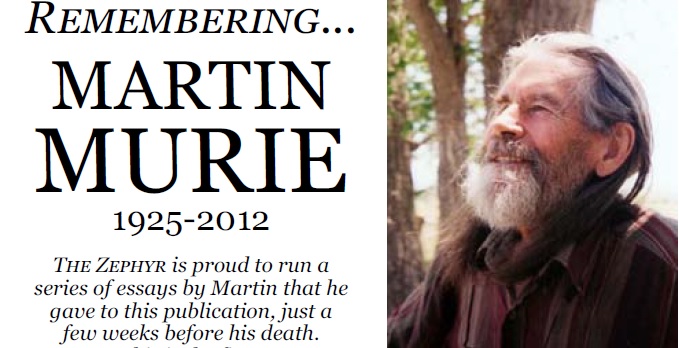
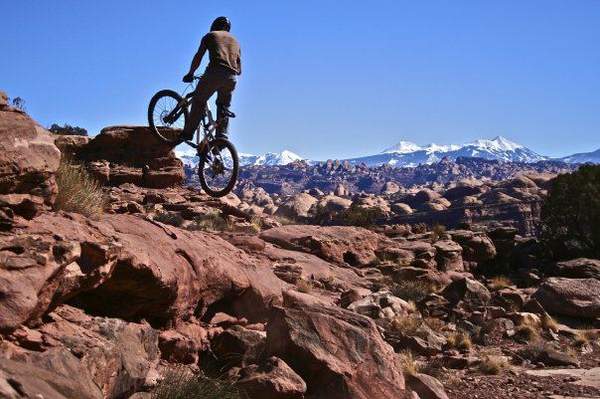





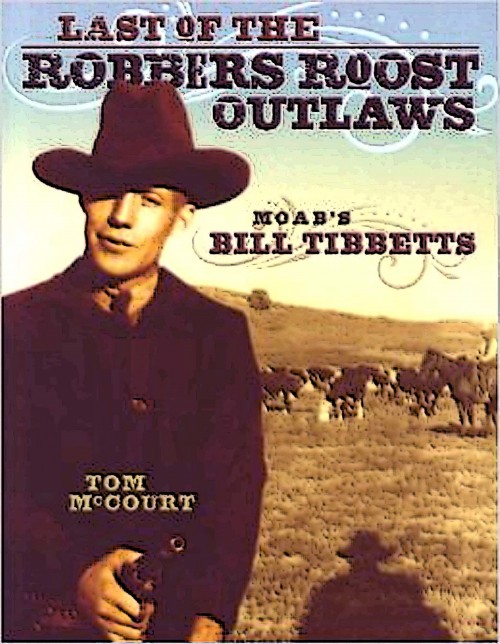


I found Zephyr when doing a search for works by my deceased brother-in-law Martin Murie…just today, right after reading that Trump is planning to open up millions of acres of the Southwest to mining and other enterprises. I am very impressed….would love to subscribe. Please send info.